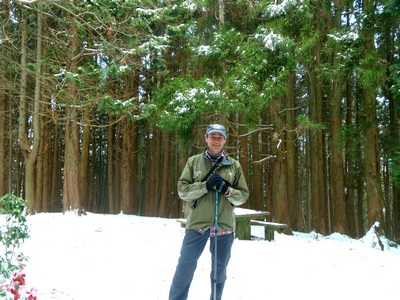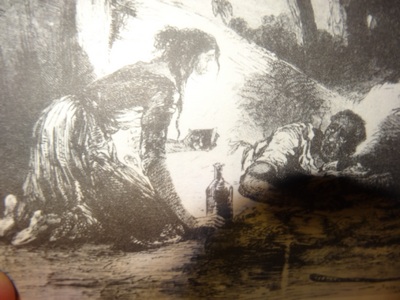“We always did feel the same . . . we just saw it from a different point of view.”
Bob Dylan
What? Felt the same? Saw things differently?
It wasn’t until Monday night that I decided to climb Ryuso Mountain Tuesday morning. (Don’t worry, it was a national holiday.) And it wasn’t until I invited someone to go along and he said, “I heard there’s about a foot of snow up there,” that it occurred to me that that probably would be so. On Saturday, Tokyo had gotten its biggest snow in years, and though we mainly got spitting snow and rain in Shizuoka City, it made perfect sense that Ryuso would’ve gotten a good bit of snow–and that up that high it couldn’t have melted yet.
And you know me, it wasn’t until I was at the beginning of the trailhead–and I saw hikers strapping on boot irons–that I realized, “Hey, boot irons probably are a good idea. You know, slippery slope, steep grade? Don’t you remember the hour of horror you experienced halfway down Mt. Shirouma back in August?” Color me stupid. Fortunately, it ended up being fairly easy going, the snow still soft, more of a cushioned carpet than an ice rink.
And well, what can I say? With all the pristine snow, I was hoping for a major dose of that shinpi (mysterious, spiritual, mystical) feeling. But there my feet were, crunch, crunch, crunching with every step, and it was impossible to stop and watch the woods fill up with snow–because the woods were already as full as they were going to get.
But it did take less time than usual to get to the top . . . or so I thought, until I looked at my watch. Hmmmh. Well, at least the trail wound and climbed in a completely new way . . . didn’t it? Yes, I was sure, someone had gotten hold of one end of it and given it a good shake. And the hikers I passed were more joyous than usual. Okay, maybe the cold did have a lot to do with their rosy cheeks, but there was something special in their expressions . . . wasn’t there?
Recently I re-read some bits from Franny and Zooey, and now I sometimes find myself thinking about the letter in which Buddy explains to Zooey his encounter with the young girl in the grocery store:
“The little girl was about four, and, to pass the time, she leaned her back against the glass showcase and stared up at my unshaven face. I told her she was about the prettiest little girl I’d seen all day. Which made sense to her; she nodded. I said I’d bet she had a lot of boy friends. I got the same nod again. I asked her how many boy friends she had. She held up two fingers. ‘Two!’ I said. ‘That’s a lot of boy friends. What are their names, sweetheart?’ Said she, in a piercing voice, ‘Bobby and Dorothy.’
Buddy tells this story because he wants Zooey to understand that it wasn’t until that very moment that he was finally struck by the profundity of something their eldest brother Seymour had once told him in a crosstown bus:
“[A]ll legitimate religious study must lead to unlearning the differences, the illusory differences, between boys and girls, animals and stones, day and night, heat and cold.”
I just knew that the shinpi feeling would come if I could only make it to the ridge, the ridge on which I always found myself thinking of Thoreau . . . but when I did get to it, it looked, well, lovely, yes . . . but there was something a bit too crispy about the snow. Looking down the ridge, trying to will my vision to encompass all, I didn’t see even the slightest extra burst of snow-driven shinpi-ness. And when I tried to take a picture (you can always doctor a digital file), the camera battery decided not to cooperate.
I stood there with my camera stuck up under my shirt–trying to get the silly battery warm.
Nothing special. Nothing different. Just a dead battery.
But I did get to the top without boot irons! Didn’t fall once! And I did see a foxy Fuji sneak out from under the clouds, just far enough that I could see a hint of her grin.
No differences. Sorry, Charlie. It’s all the same. Just a different point of view.
For what it’s worth, my belly did get the battery going again.
Did I imagine
The magic of sun-lit snow?
All the glowing cheeks?
A leaf skitters across snow.
A different silence.











